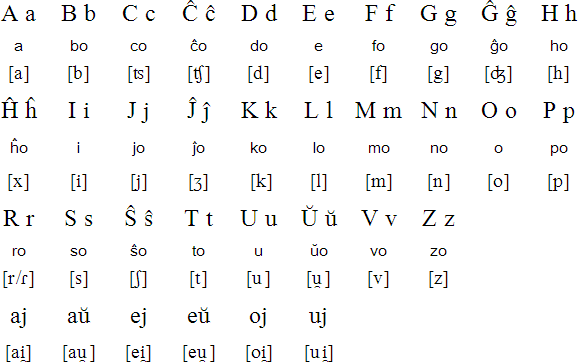Vidu ĉi tiu paĝo en:
Esperanto
Esperanto is an international auxiliary language devised in 1887 by Dr. Ludwig Lazarus Zamenhof (1859-1917), an eye doctor, under the pseudonym of "Doktoro Esperanto". He originally called the language "La Internacia Lingvo" (The International Language), but it soon became known as Esperanto, which means "the hoping one".
Zamenhof was born in the Polish city of Bialystok which at that time was home to a polyglot, multiethnic mixture of Poles, Russians, Jews, Lithuanians and Germans. He believed that much of the distrust and misunderstanding between the different ethnic groups was a result of language differences, so he resolved to create an international language which could be used as an neutral lingua franca and could help break down the language barriers.
Zamenhof's first work on Esperanto, the "Unua Libro" (First Book) published in 1887, contained 920 roots from which tens of thousands of words could be formed, together with the "Fundamenta Gramatiko" (Fundamental Grammar), which consisted of 16 basic grammatical rules. Zamenhof renounced all rights to Esperanto and encouraged comments and suggestions on the development of the language. The first Universal Esperanto Congress (La Unua Universala Esperanto Kongreso) was held at Boulogne-sur-Mer in 1905.
The majority of Esperanto roots are based on Latin, though some vocabulary is taken from modern Romance languages, and from English, German, Polish and Russian. Roots can be combined with affixes to form new words, for example: lerni = to learn, lernejo = a school, lernanto = a pupil/student, lernejestro = a headmaster. The affixes can also stand alone: ejo = place, estro = leader/head, etc. The grammar has many influences from Slavic languages, although it is greatly simplified in comparison to them.
Spelling conventions are somewhat similar to Polish, though Zamenhof came up with some new letters for Esperanto (Ĉĉ, Ĝĝ, Ĥĥ, Ĵĵ, Ŝŝ, Ŭŭ). These letters are often replaced with ch, gh, jh or cx, gx, jx, or c', g', j', etc. Zamenhof recognised this problem and favoured using ch, gh, etc when the special letters were not available.
Today Esperanto is the most widely used international auxiliary language. The Universal Esperato Association (UEA) / La Universala Esperanto-Asocio has members in 120 countries, and there are national Esperanto associations in 70 countries. Esperanto is most spoken in Japan, China, France, Germany, Italy, Poland, the USA, Brazil, Belgium and the UK. The number of Esperanto speakers is not known for certain, however the UEA estimates that there are hundreds of thousands and possibly millions of them. The places were Esperanto is spoken are known collectively as Esperantujo ("Esperanto-land").
According to Ethnologue, there are about 101,000 Esperanto speakers, including about 1,000 native speakers.
There is a flourishing Esperanto literature including books, magazines and poetry. Some of the literary works are originally written in Esperanto while others are translated from other languages. There are also Esperanto songs and a number of radio stations broadcast news bulletins in Esperanto.
Source: http://en.wikipedia.org/wiki/Esperanto
Recordings in the text by Jan Jurčík

A recording of the Esperanto alphabet by Jan Jurčík
Download an alphabet chart for Esperanto (Excel)
Ĉiuj homoj estas denaske liberaj kaj egalaj laŭ digno kaj rajtoj. Ili posedas racion kaj konsciencon, kaj devus konduti unu al alia en spirito de frateco.
A recording of this text by Simon Ager
All human beings are born free and equal in dignity and rights. They are endowed with reason and conscience and should act towards one another in a spirit of brotherhood.
(Article 1 of the Universal Declaration of Human Rights)
Note: the people in this video are native speakers of Esperanto.
Information about Esperanto | Phrases | Numbers | Time | Family words | Tower of Babel | Articles | Learning materials
Information about Esperanto
http://www.esperanto.net
http://en.wikipedia.org/wiki/Esperanto
https://www.ethnologue.com/language/epo
UEA: Universala Esperanto-Asocio
http://www.uea.org
Esperanto group on Facebook
https://www.facebook.com/groups/esperanto.grupo/
Online Esperanto lessons
http://eo.lernu.net
http://pacujo.net/esperanto/course/
http://polymath.org/esperanto.php
https://www.duolingo.com/course/eo/en/Learn-Esperanto-Online
http://www.romaniczo.com/esperanto/index.html
http://bertilow.com/pmeg/
Online Esperanto phrases
http://esperantophrases.tripod.com/
http://www.esperanto-chicago.org/phrases.htm
Online Esperanto dictionaries
http://www.la-vortaro.net
http://www.uni-leipzig.de/esperanto/voko/revo/
http://dictionaries.travlang.com/EnglishEsperanto
http://www.denisowski.org/Esperanto/ESPDIC/espdic_readme.htm
http://vortaro.net
Online Esperanto translation
http://traduku.net
https://translate.google.com/#en/eo/
Esperanto radio & TV
http://www2.polskieradio.pl/eo/
http://esperanto.cri.cn
http://www.radiovaticana.va/esp/
http://www.osiek.org/aera/
http://radioarkivo.org
http://muzaiko.info
http://esperanto-tv.com/radio
http://www.youtube.com/user/EsperantoTv
Esperanto news
http://osiek.org/lagazeto/
http://www.liberafolio.org
http://www.gazetejo.org/gazetoj
http://pilgrimantobrazilo.blogspot.co.uk/
Esperanto literature and translations
http://esperanto.net/literaturo/
https://sites.google.com/site/originalaesperantoliteraturo/
http://timwestover.com/marvirinstrato/
http://esperanto.us
http://www.esperanto.mv.ru/ESP/literaturo.html
Esperantomuseum (Vienna)
https://www.onb.ac.at/en/museums/esperanto-museum
Blissymbolics, Esperanto, Folkspraak, Glosa, Ido, Interglossa, Interlingua, Interlingue/Occidental, Interslavic, Lingua Franca Nova, Lojban, Novial, Romance Neolatino, Romániço, Slovio, Solresol, Uropi, Volapük
Languages written with the Latin alphabet
Page last modified: 26.06.22
[top]
You can support this site by Buying Me A Coffee, and if you like what you see on this page, you can use the buttons below to share it with people you know.

If you like this site and find it useful, you can support it by making a donation via PayPal or Patreon, or by contributing in other ways. Omniglot is how I make my living.
Note: all links on this site to Amazon.com, Amazon.co.uk
and Amazon.fr
are affiliate links. This means I earn a commission if you click on any of them and buy something. So by clicking on these links you can help to support this site.
[top]